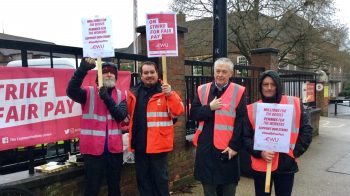Poor delegates struggle in Copenhagen
TEXT OF STORY
Kai Ryssdal: Those world leaders Sam was just talking about, they’re all going to have their own cars, or their own motorcades. Many of them will show up on their own planes. And they’re going to stay in hotels that are charging more than $1,000 a night. Nice living, for those who can afford it. Delegates to the conference who can’t, though, are having a tough time as Marketplace’s Stephen Beard reports.
STEPHEN BEARD: Don’t tell Margaret Kyenkya — a delegate from Uganda — that she’s been living high off the hog in Copenhagen. She’s been scraping by at the summit on little more than $100 a day.
KYENKYA: We’re staying with people. We couldn’t afford a hotel. We buy bread from the shops, and we make sandwiches. Yesterday ate cookies and popcorn. Copenhagen is really, really expensive.
Margaret has not been inside a restaurant or even a cafe since she arrived. Everyday she shops for food at a supermarket near her digs. Even that is proving prohibitively expensive.
KYENKYA: At home I buy 10 lemons for 50 cents, U.S. dollars. For 1,000 shillings. Look at the price here! 35! That’s almost $10.
BEARD: Instead of 50 cents.
KYENKYA: Instead of 50 cents. And I have not been able to drink a lemon. I feel like my stomach is holding out. I’ve not eaten an orange. Yesterday I bought one banana, I ate one banana for lunch with my popcorn. It’s killing me.
Margaret is here as a member of an NGO, or non-governmental organization. She’s lobbying negotiators on the issue of climate change and deforestation.
Xavier Mugumya is here as an official in the Ministry of Water. He’s a bit better off. His daily allowance: $300. But even the most modest hotels here cost $250 a night. And Xavier blew three days worth of his daily rate on emergency expenditure.
XAVIER MUGUMYA: Buying warm clothing.
BEARD: Oh, you’ve had to buy some warm clothing?
MUGUMYA: Yes, I had no idea what it would be looking like here. So I had to buy something that you put on your hands.
BEARD: Gloves?
MUGUMYA: Gloves, undies. Everything. Otherwise you freeze here.
Throughout the two-week summit, Copenhagen has laid on scores of events, for the delegates: mini-conferences, seminars and exhibitions. Travel by metro is free. But Xavier has been scared off attending some of the events.
MUGUMYA: I cannot go sometimes because the metro would not be going directly there. And sometimes I fear that if I take a cab I do not know how much the meter will read.
Poor countries are struggling to attend this summit. Their negotiating teams are much smaller and less specialized than those of the developed world. They’re at a disadvantage, says Hugh Cole of the aid agency Oxfam.
HUGH COLE: These developing country negotiators clearly have a distinct handicap, and it’s down to a lack of resources. Despite that, they are putting up a real fight and representing their country and their poorest people. This is real David and Goliath stuff.
Only this time, many observers say, Goliath seems likely to win. And they say the poor countries won’t get anything like the financial aid or the deep cuts in carbon emissions they’re seeking.
But Margaret Kyenkya is hoping for the best.
KYENKYA: We hope whatever comes out will help us. We have no alternative but to make that investment in terms of time, in terms of cost. Our government investing in this, and we hope something will come out.
In Copenhagen, this is Stephen Beard for Marketplace.
There’s a lot happening in the world. Through it all, Marketplace is here for you.
You rely on Marketplace to break down the world’s events and tell you how it affects you in a fact-based, approachable way. We rely on your financial support to keep making that possible.
Your donation today powers the independent journalism that you rely on. For just $5/month, you can help sustain Marketplace so we can keep reporting on the things that matter to you.


















